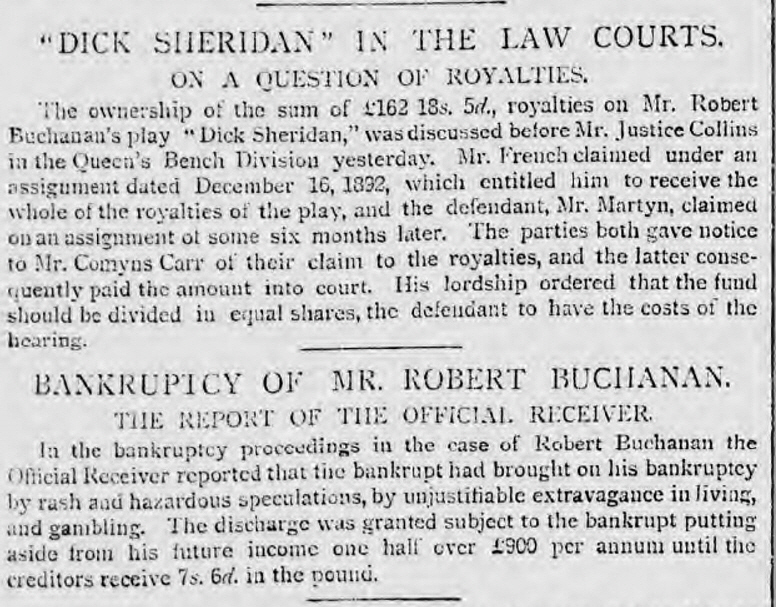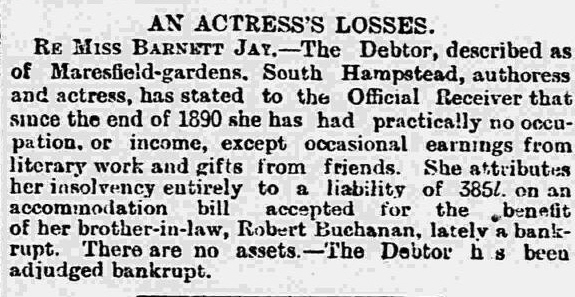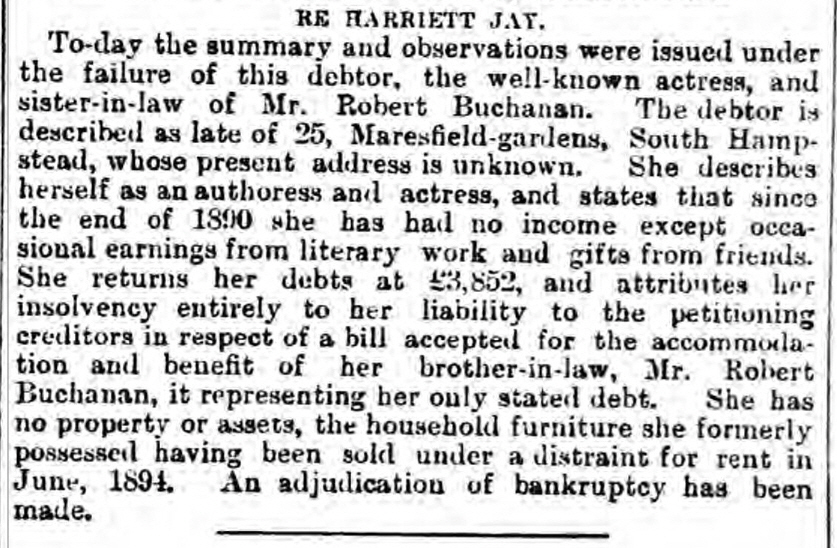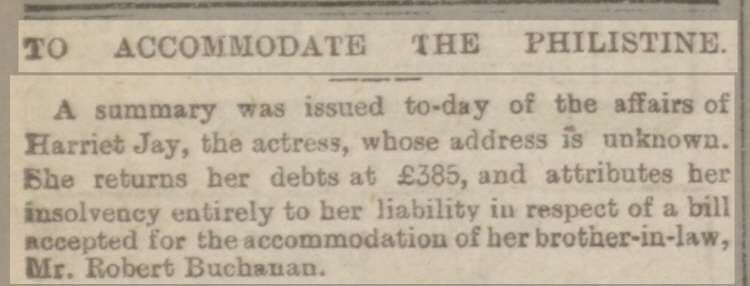ROBERT WILLIAMS BUCHANAN (1841 - 1901)
|
ROBERT WILLIAMS BUCHANAN (1841 - 1901) |
|
|
|
|
|
|
|
|
BUCHANAN AND THE LAW (6)
Although this case did not involve Robert Buchanan directly, he was the cause of it. It also adds a little more information on the state of his financial situation just prior to his bankruptcy. The production of Dick Sheridan at the Comedy Theatre ran from 3rd February to 30th March, 1894.
Pall Mall Gazette (30 November, 1894 - p.8) |
 |
|
The Era (1 December, 1894 - p.15) “DICK SHERIDAN.” In the Court of Queen’s Bench on Thursday, before Mr Justice Collins, the case of French v. Martyn came on for trial in the form of an interpleader issue to decide the question whether the sum of £162 18s. 5d. was the property of Mr Samuel French or of Mr W. E. Martyn. The amount had been paid into court by Mr Comyns Carr, of the Comedy Theatre. ___
The Standard (2 March, 1895 - p.2) COURT OF APPEAL. S. FRENCH V. W. E. MARTYN.—In this case, which was an appeal by Mr. S. French, the dramatic publisher, of 89, Strand, from a judgment of Mr. Justice Collins, without a Jury, on an interpleader issue, Mr. Dickens, Q.C. (with whom was Mr. Morton Smith) explained that it arose out of assignments by Mr Robert Buchanan, the dramatist and novelist, of his interest in the royalties and sales of his works, including the royalties in the comedy of Dick Sheridan, produced by Mr. Comyns Carr at the Comedy Theatre. The royalties on Dick Sheridan, which Mr. Buchanan had assigned to Mr. French, amounted altogether to 260l., and the Appellant’s case was that Mr. Buchanan had mortgaged his interest in the piece to him, on condition that he handed half of the royalties received by him over to the author and kept the other half himself until his claim was satisfied. Subsequently, before Dick Sheridan was completed, an advance of 50l. was obtained by Mr. Buchanan from Mr. Comyns Carr, and afterwards the Defendant in the present interpleader issue, Mr. Martyn, also obtained a charge on the royalties, and by a deed signed on 1st July last year he was authorised by Mr. Buchanan to collect the royalties on the play. _____
The Morning Post (29 April, 1895 - p.7) BANKRUPTCY COURT.—SATURDAY. RE HARRIET JAY. A receiving order was recently made against this debtor, the well-known actress, she being described as of 25, Maresfield-gardens, South Hampstead, spinster, present address unknown. She now states that she left Maresfield- gardens in June last, when her brother-in-law, Mr. Robert Buchanan, who rented the house, was made a bankrupt. The furniture, which was hers, was all sold under a distress for rent. She now resides with her sister, and has no assets whatever. The debts were not stated. Messrs. Hicks, Arnold, and Mosley are the solicitors to the proceedings. ___
The Pall Mall Gazette (14 May, 1895) IN THE BANKRUPTCY COURT TO-DAY. THE AFFAIRS OF MISS HARRIET JAY. The Official Receiver issued the usual summary in the case of Miss Harriet Jay, described as late of Maresfield- gardens, South Hampstead, authoress and actress. The debtor has stated that since the end of 1890 she has had practically no occupation or income except occasional earnings for literary work and gifts from friends. The liability is for £385 on an accommodation bill accepted by the debtor for the benefit of her brother-in-law, Robert Buchanan, lately bankrupt. There are no assets. ___
[There are mistakes in the following two reports: The Standard gets her name wrong, The Morning Post, the amount of her debt.] The Standard (15 May, 1895 - p.3) |
|||
 |
|||
|
The Morning Post (15 May, 1895 - p.4) |
|||
 |
|
The New York Times (15 May, 1895) An English Writer in Bankruptcy. LONDON, May 14.—Harriet Jay, the authoress and actress, sister-in-law of Robert Buchanan, the playwright and author, has been declared a bankrupt. _____ Robert Buchanan was declared in bankruptcy recently, to the intense indignation of Mr. Labouchère, who cannot understand how a pensioner of the Government may spend more than his income. ___
The Leeds Times (18 May, 1895 - p.8) |
 |
|
The Era (18 May, 1895) IN the Court of Bankruptcy on Tuesday, the case of Miss Harriett Jay was mentioned. The debtor, described as of Maresfield-gardens, South Hampstead, authoress and actress, has stated to the Official Receiver that since the end of 1890 she has had practically no occupation, or income, except occasional earnings from literary work and gifts from friends. She attributes her insolvency entirely to a liability of £385 on an accommodation bill accepted for the benefit of her brother-in-law, Robert Buchanan, lately a bankrupt. There are no assets. The debtor has been adjudged bankrupt. ___
The Referee (19 May, 1895 - p.2) In the Court of Bankruptcy on Tuesday, the Official Receiver issued the usual summary in the case of Miss Harriet Jay, described as late of Maresfield-gardens, South Hampstead, authoress and actress. The debtor has stated that since the end of 1890 she has had practically no occupation or income, except occasional earnings for literary work and gifts from friends. The liability is for £385 on an accommodation bill, which, being a Jay, the debtor accepted for the benefit of her brother-in-law, Mr. Robert Buchanan. Assets, nil. ___
The Morning Post (21 May, 1895 - p.4) BANKRUPTCY COURT.—MONDAY. This was a meeting of the creditors of this debtor, the authoress and actress, described as of late of Maresfield- gardens, South Hampstead. The receiving order was made on the petition of the Union Deposit Bank, King William- street, Strand, creditors for £386 in respect of a bill drawn by her brother-in-law, Mr. Robert Buchanan, and accepted by her. This forms the only liability. The debtor was in attendance, accompanied by her solicitor, Mr. W. A. Colyer. In reply to the Chairman, Mr. Colyer said that his client had no offer to make. The Chairman—Have you any assets? The Debtor—No, sir.—The case was then left in the hands of the Official Receiver to wind up in bankruptcy. ___
The Times (14 June, 1895 - p.14) IN RE JAY. The debtor, Miss Harriett Jay, until recently residing at an address in Maresfield-gardens, South Hampstead, attended for public examination. ___
The Era (15 June, 1895) AT the Bankruptcy Court, on Thursday, Miss Harriett Jay attended for her public examination, the bankrupt, an authoress and actress, applying to pass upon accounts showing debts £385 and assets nil. The debtor stated that she was an actress and authoress, and that her bankruptcy was solely attributable to her having accepted a bill for £200 on behalf of her brother-in-law (Mr Buchanan). At the time she accepted the bill she had furniture of her own and also a banking account. Part of the furniture was given her by her brother-in-law, and part she had purchased. All her furniture had been seized and sold by the landlord for rent owing by her brother-in-law. She had not protested against the furniture being sold, as she was told that the landlord could take anything. The furniture was not sold; it was given away. She had not been able to act for the last three or four years owing to an accident. She had only one creditor, viz., the petitioning creditor, in respect of whose bill she had not received one shilling of remuneration. The examination was concluded.
[Note: ___
The Pall Mall Gazette (25 July, 1895) IN THE BANKRUPTCY COURT TO-DAY. THE AFFAIRS OF MISS HARRIET JAY. An application was made for an order of discharge on behalf of Miss Harriet Jay, actress and authoress. The only debt was for £385 and costs upon a promissory note accepted by plaintiff for the accommodation of Mr. Robert Buchanan, her brother-in-law. A discharge was granted, subject to judgment for £385 being entered against the bankrupt. ___
The Standard (26 July, 1895 - p.6) AN ACTRESS’S INSOLVENCY. RE HARRIET JAY.—This was an application for an order of discharge. The Bankrupt, an authoress and actress, attributed her insolvency to a liability incurred by her on a bill for 300l. which she had accepted for the accommodation of her brother-in-law, Mr. Robert Buchanan. There were no other debts, and the only matter reported by the Official Receiver as an offence had reference to the absence of assets. It appeared that the Bankrupt, owing to an accident, had been unable for several years to follow her profession as an actress, and had been dependent upon small earnings from literary work and gifts from friends.—Mr. W. A. Colyer appeared in support of the application, and Mr. R. Raphael on behalf of the petitioning Creditor; Mr. H. Brougham attending as Official Receiver.—The discharge was granted subject to a judgment for 75l. being, with the consent of the Bankrupt, entered against her. _____
Following his bankruptcy, Robert Buchanan received an even greater blow in November 1894 with the death of his mother. The following year his fortunes changed again when his next play, The Strange Adventures of Miss Brown, a comedy obviously inspired by the success of Charley’s Aunt, was a hit. It was written in collaboration with ‘Charles Marlowe’; a pseudonym adopted by Harriett Jay, presumably because when she was making her own appearance in the Bankruptcy Court on 25th July, 1895, the play had been running at the Vaudeville Theatre for a month (and would continue to play in London until February, 1896). With this improvement in his finances, Buchanan then became his own publisher, issuing The Devil’s Case in March 1896. The following lines occur towards the start of the poem: Night lay o’er the Heath of Hampstead— All that afternoon I’d wander’d Sad my soul had been among them, Since my name and fame were lying Bankrupt thus in fame and fortune, Buchanan’s self-publishing venture failed, but he continued to write novels, poetry, and a succession of plays with Harriett Jay, which met with varying degrees of success. In October 1900 he suffered the massive stroke which rendered him comatose for the last eight months of his life. He died on 10th June, 1901 and shortly after, the following reports appeared in the press.
The Yorkshire Evening Post (18 June, 1901 - p.4) THE LATE ROBERT BUCHANAN’S ESTATE. At the London Bankruptcy Court to-day, a receiving order was made against the estate of the late Robert Buchanan. ___
The Times (22 June, 1901 - p.14) THE BANKRUPTCY ACTS, 1883 and 1890. IN LONDON. RECEIVING ORDERS. Buchanan, Robert (deceased). Southside, Clapham-common, S.W., late Lewin-road, Streatham, S.W. ___
The Yorkshire Evening Post (5 July, 1901 - p.6) MR. R. BUCHANAN’S AFFAIRS. The creditors of the late Mr. Robert Buchanan, author and playwright, met this afternoon. The Official Receiver said he did not anticipate there would be any assets for the present creditors. The case was left in the hands of the Court. ___
The Times (6 July, 1901 - p.17) (Sittings in Bankruptcy, before MR. E. LEADAM HOUGH, Senior Official Receiver.) IN RE BUCHANAN. This was the first meeting of creditors under a receiving order made on June 18 against Robert Buchanan, deceased, the well-known author and dramatist. The proceedings were founded on a petition presented by a creditor, who claimed £65 8s. 5d. in respect of moneys advanced. ___
The Edinburgh Evening News (6 July, 1901 - p.5) WINDING UP OF ROBERT BUCHANAN’S AFFAIRS. At London Bankruptcy Court yesterday, the first meeting of the creditors of the late Mr Robert Buchanan, the well-known dramatist, was held. The proceedings were instituted prior to the debtor’s death, which took place before the making of the receiving order. The chairman stated that only two proofs for £78 were put in. So far as he was able to ascertain the deceased had no assets. In due course a statement of accounts would be prepared. Under Mr Buchanan’s previous bankruptcy, an order was made to set aside a part of his earnings, over £900 a year, which order had been unproductive. He did not anticipate any assets under these proceedings, which would remain in his hands to wind up in bankruptcy. ___
The Era (13 July, 1901 - p.14) IN the Court of Bankruptcy on the 5th inst., before Mr E. L. Hough, Official Receiver, a first meeting of creditors was held under a receiving order made by the court against the estate of the late Robert Buchanan, the well-known author and playwright, who recently died at an address in Lewin-road, Streatham, S.W. The chairman stated that so far as he could ascertain there were no assets; at least, that was the information given to him by the debtor’s solicitors. A statement of the liabilities and assets would, however, be prepared. There had been a previous bankruptcy, under which proceedings it was arranged that the debtor should set aside one-half of anything over £900 per annum he might earn, but so far that order had been unproductive, and he did not anticipate anything for the present creditors. In the absence of a quorum, the matter now remained in his hands as trustee for administration. ___
The New York Times (13 July, 1901) Certain London papers which gave more or less sympathetic accounts of the funeral of the late Robert Buchanan, printed elsewhere in obscure places the following pathetic legend: _____
I’ve placed this court case last, outside the chronological order, because I can’t be sure that it is the ‘right’ Robert Buchanan. I like to think it is though, and that he was moved by the report in The Era to help out a fellow ‘showman’. I also love the description of what passed for a show in Victorian England.
The Daily Telegraph (5 January, 1891- p.3) WESTMINSTER.—THE SHOWMAN’S COURTSHIP.—James Lewis, 25, a travelling showman and toy maker, was charged on a warrant, before Mr. De Rutzen, with an offence under the Criminal Law Amendment Act, in respect of a girl, under sixteen years of age, named Annie Treadwell, whose parents reside in Alfred-place, Flood-street, Chelsea. The prisoner, a tall good-looking young fellow, was poorly dressed. The girl, short of stature, very dark-eyed and complexioned, almost like a gipsy, gave her evidence with some reluctance and with her head averted from the dock except when the accused cross-examined her and requested her to look at him as she answered his questions.—It was stated that the prosecution was instituted by her parents, and her father told the magistrate that during the period she was away from home he thought she was in service.—In answer to Mr. De Rutzen, she said that she was fifteen years of age last October, and on the Monday before Christmas she made the acquaintance of the defendant, who assisted at a show which had been fitted up at what was formerly a greengrocer’s shop, in the King’s-road, Chelsea. There was “a fat lady” on exhibition, followed by “two dark men,” and at her visit to see the latter on the Monday night she remained till the place closed.—Mr. De Rutzen: Did the prisoner ask you to do so?—Witness: Yes; and I remained all night. I stayed several nights with him, and when the show broke up I went with him to a place off New-street, Borough-road, and remained in the caravan.—Prisoner: Annie, dear, do you remember telling me the first night we met that your mother had said that you had “better take your hook”?—Witness (in a low tone): Yes.—Did I ask your age?—Yes; and I told you that I was seventeen last October.—Each day we were together did I not press you to go home, although I liked you?—Witness: Yes.—And did you not say, “No, Jem; I can’t leave you”?—Yes.—Mr. De Rutzen asked the girl what made her tell the defendant an untruth as to her age. For a long time no answer could be obtained, but at length she said that she was afraid if she told him the truth he would not let her remain.—Further questioned by the prisoner, she admitted telling him that she was three weeks away from home once before. Also that her parents beat her.—Prisoner: The fact is, the girl and I truly love each other. We were making arrangements to settle in life, and things were all being made right.—Mr. De Rutzen, recalling the complainant, asked her whether the accused spoke to her on the subject of getting married.—Witness: Yes, sir. She further said that the first night she remained in the prisoner’s place there was no impropriety. Constable Rangler, 64 B R, deposed that the girl’s parents having reported her missing, he traced the couple to a yard in New-street, Borough-road, where they were staying together in a caravan. The result of his making inquiries was that the girl was sent home.—Mr. De Rutzen: And he parents applied for a warrant?—Witness: Yes, and I executed it at half-past one this (Saturday) morning. I found the defendant alone in the caravan, asleep. When I told him the girl was under sixteen he said, “She told me she was over seventeen. I did not expect this, and if things had not turned out as they have we should soon have been married, and I should have made a woman of her. I first met her in the King’s-road, Chelsea, and I took a fancy to her. I love her, and she took a fancy to me. I heard you were about the night before last, so I made her go home, although she said she would not, as her father and mother knocked her about.”—Mr. De Rutzen told the defendant that he had the right of giving evidence on oath.—The accused was accordingly sworn, and repeated the statement given above.—He added that he courted the girl with the intention of marrying her, and said that, believing she was over seventeen, he did not insist on her going home when she pleaded to stop with him.—Mr. De Rutzen told the defendant he must commit him for trial to the Central Criminal Court, but he would take one bail in £10 for his appearance.—Defendant went to prison, as no one came to bail him. ___
The Times (5 January, 1891 - p.3) At WESTMINSTER, JAMES LEWIS, 25, a travelling showman and toymaker, was charged on a warrant before Mr. de Rutzen with an offence under the Criminal Law Amendment Act in respect of a girl, under 16 years of age, named Annie Treadwell, whose parents reside in Alfred-place, Flood-street, Chelsea. The girl gave her evidence with some reluctance. It was stated that the prosecution was instituted by her parents, and her father told the magistrate that during the period she was away from home he thought she was in service. In answer to Mr. de Rutzen the girl said that she was 15 years of age last October, and on the Monday before Christmas she made the acquaintance of the defendant, who assisted at a show in the King’s-road, Chelsea. She remained till the place closed. The prisoner asked her to remain, and she remained all night, and then several nights with him, and when the show broke up she went with him to a place off New-street, Borough-road, and remained in the caravan. In answer to the prisoner she admitted that on the night they met she informed him that her mother had told her she had better “take her hook.” She had also told the prisoner that she was 17 last October, and every day he urged her to go home. In answer to the magistrate she said that she was afraid if she told prisoner the truth about her age he would not let her remain. Further questioned by the prisoner, she admitted telling him that she was three weeks away from home once before, also that her parents beat her. Prisoner.—The fact is the girl and I truly love each other. We were making arrangements to settle in life, and things were all being made right. Mr. de Rutzen, recalling the complainant, asked her whether the prisoner spoke to her on the subject of getting married. Witness.—Yes, Sir. She further said that the first night she remained in the prisoner’s place no impropriety took place. Afterwards their relations were of a different nature. Evidence was then given as to the arrest of the prisoner on a warrant applied for by the parents. Accused expressed his willingness to be sworn, and proceeding from the dock to the witness-box repeated in effect the statement he had already made on arrest, that the girl had told him she was over 17. He added that he courted the girl with the intention of marrying her, and said that, believing she was over 17, he did not insist on her going home when she pleaded to stop with him. Mr. James Robert Haines, surgeon, gave evidence which was consistent entirely with the defendant’s own admission and the girl’s statement. Mr. de Rutzen told the defendant he must commit him for trial to the Central Criminal Court, but he would take one bail in £10 for his appearance. Defendant went away to prison as no one came to bail him. ___
The Era (10 January, 1891) A SHOWMAN’S COURTSHIP. James Lewis, aged twenty-five, a travelling showman and toy maker, was charged on a warrant before Mr De Rutzen at Westminster Police-court, on Saturday, with an offence under the Criminal Law Amendment Act in respect of a girl under sixteen years of age, named Annie Treadwell, whose parents reside in Alfred-place, Flood-street, Chelsea. The prisoner, a tall young fellow of fine physique and good countenance, was poorly dressed. The girl, short of stature, very dark-eyed and complexioned, almost like a gipsy, gave her evidence with some reluctance, and with her head averted from the dock, except when the accused cross-examined her, and requested her to look at him as she answered his questions. It was stated that the prosecution was instituted by her parents, and her father told the magistrate that during the period she was away from home he thought she was in service. ___
The Daily Telegraph (15 January, 1891 - p.3) CENTRAL CRIMINAL COURT—JAN. 14. (Before the RECORDER.) THE SHOWMAN’S COURTSHIP.—James Lewis, 26, on bail, surrendered to answer a charge of criminally assaulting Annie Treadwell, a girl under the age of 16. The prisoner is by profession a showman, and among the visitors to his exhibition at Chelsea, which consisted of a fat lady and two dark men, was the prosecutrix. One night when the show was closing the girl came in again, stated that her mother had turned her out of doors, and asked for shelter. This was given her, and no impropriety appears to have occurred until the following night, after the prosecutor had vainly urged the girl to return home, and had received her assurance that she was seventeen years of age. The prosecutrix, who now admitted that her statements were incorrect, afterwards went home with the prisoner. On being apprehended the accused said that if he had not been interfered with he would have married the girl, and he now went into the box and declared that he was as ready as ever to lead her to the altar.—Mr. Martyn, instructed by Mr. Robert Buchanan, who had bailed the prisoner upon reading the police-court proceedings, urged that an acquittal would in these circumstances be the best possible thing for all parties; and the jury, acquiescing in the suggestion, found Lewis not guilty. _____
Back to Buchanan and the Law main menu
|
|
|
|
|
|
|